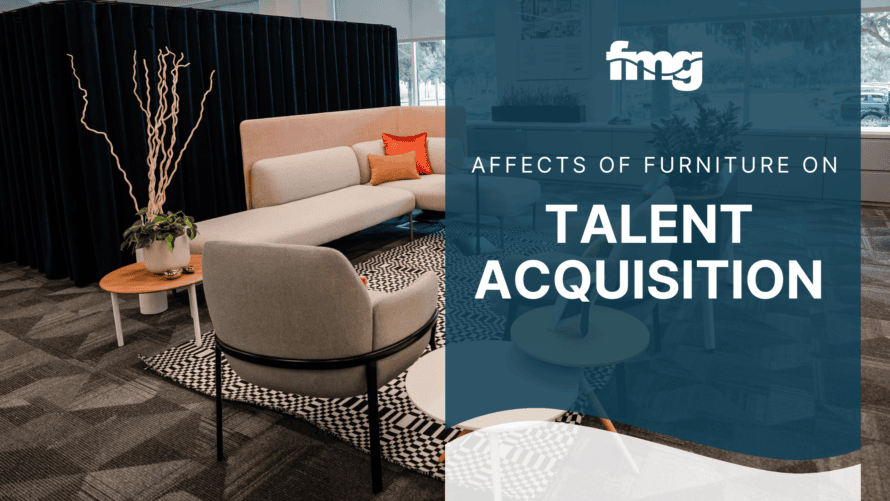In today’s competitive job market, the design of your office space can be a powerful tool in attracting (and retaining) top talent. Office furniture plays a crucial role in creating an environment that reflects your company’s culture and fosters productivity and well-being.
By strategically selecting and arranging your office furniture, you can create a welcoming and dynamic workplace that appeals to the aspirations of potential employees. In this discussion, we will explore how the right choice of office furniture can enhance talent acquisition efforts, offering insights that empower you to transform your workspace into a magnet for the industry’s best and brightest.
Key Takeaways
- Enhance Talent Attraction: Office furniture reflects your company culture and attracts talent by creating an inviting and dynamic workspace.
- Prioritize Employee Well-being: Ergonomic designs show you value health, boosting satisfaction and retention.
- Sustainability Matters: Choosing eco-friendly furniture aligns with the values of eco-conscious employees, enhancing your appeal.
- Adaptability is Key: Flexible spaces with modular furniture meet diverse needs, fostering innovation and collaboration.
- Comfort and Productivity: Comfortable work environments improve focus and output, fostering loyalty and reducing turnover.
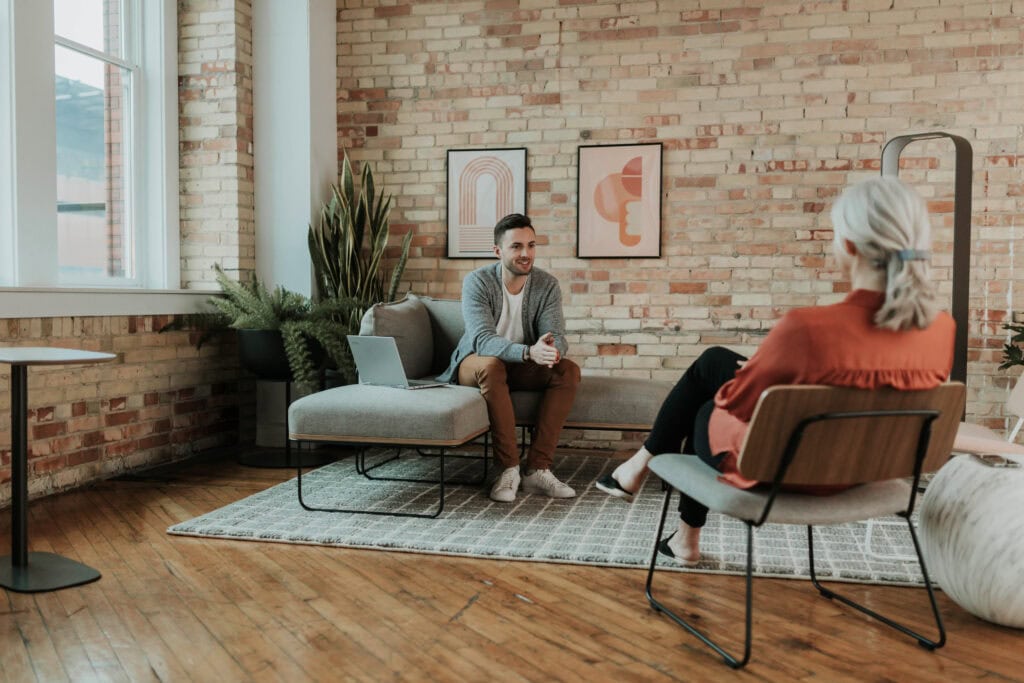
Beyond Aesthetics: The Real Influence in 2025
As we look towards 2025, office furniture is set to transcend mere aesthetics, becoming a crucial element in talent acquisition and retention strategies. Companies now recognize furniture is about style, functionality, and employee well-being. Ergonomic designs, such as adjustable desks and supportive chairs, are essential for creating a comfortable workspace that reduces physical strain. Moreover, sustainability in furniture choices reflects a company’s commitment to environmental responsibility, aligning with the values of a younger, eco-conscious workforce.
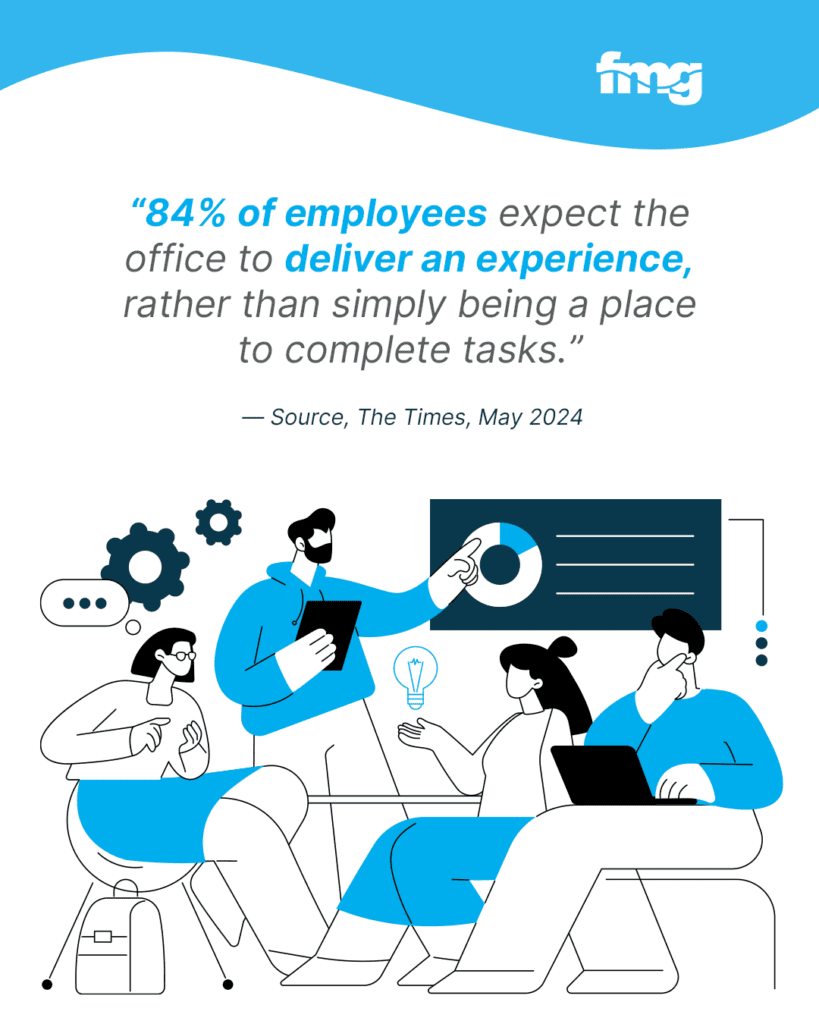
As employees increasingly seek workplaces that cater to their health and lifestyle needs, the role of thoughtfully designed furniture becomes undeniable. The focus is shifting towards creating adaptable spaces that encourage collaboration and innovation, promoting a culture of inclusivity and flexibility. In essence, office furniture in 2025 will be a testament to an organization’s dedication to fostering a thriving, engaged, and satisfied workforce.
Aligning Design with Company Culture
Office furniture is a powerful medium through which a company can convey its culture and values. In today’s work environment, where talent acquisition is fiercely competitive, aligning your office furniture design with your company’s ethos becomes crucial. For instance, a tech startup might opt for sleek, modern furniture to reflect innovation and agility. At the same time, an eco-friendly company could choose sustainable materials to demonstrate environmental commitment. This alignment creates a cohesive experience for employees and candidates, reinforcing the company’s identity at every touchpoint. Moreover, furniture that supports a collaborative culture, such as communal tables and open spaces, encourages team interaction and idea-sharing.
By carefully curating furniture that resonates with your company’s mission and values, you enhance employee engagement and attract like-minded individuals more likely to thrive within your organization. Your office design becomes a living embodiment of your brand and culture.
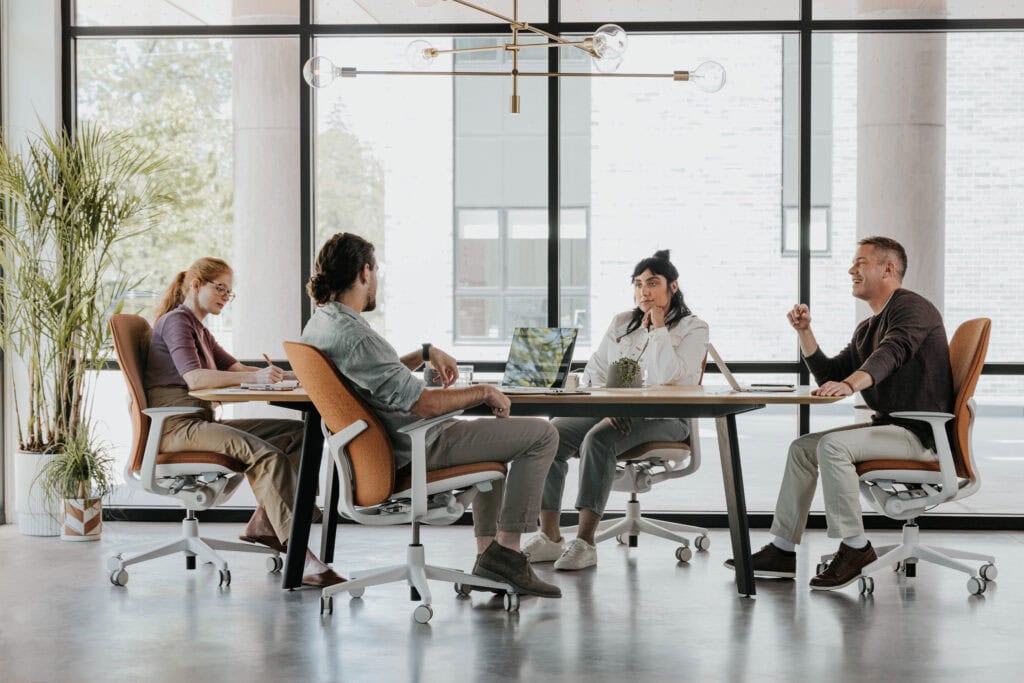
Key Furniture Elements for Attraction
Ergonomic designs have become indispensable in promoting employee well-being and productivity. Companies can significantly impact talent acquisition and retention. Ergonomic furniture, such as adjustable chairs and desks, supports proper posture and reduces the risk of work-related injuries like back pain or repetitive strain injuries. This, in turn, can lead to improved job satisfaction and reduced absenteeism. Employees who feel physically comfortable in their workspace will likely stay engaged and loyal to the company.
Furthermore, the focus on ergonomics sends a clear message to potential talent that the organization values its employees’ health and well-being. As work-life balance becomes increasingly important, providing ergonomic solutions demonstrates a commitment to creating a supportive and sustainable work environment. By investing in ergonomic furniture, companies enhance employee well-being and position themselves as attractive employers in a competitive job market.
Flexible Spaces for a Dynamic Workforce
In today’s dynamic work environment, adapting to changing needs is vital. Flexible spaces equipped with versatile furniture cater to the diverse demands of a modern workforce. Modular furniture systems that can be easily reconfigured support various work styles, from collaborative meetings to focused, individual tasks. This flexibility enhances productivity and fosters a sense of ownership and autonomy among employees, as they can tailor their workspace to suit their preferences and tasks. Additionally, movable partitions and adaptable seating arrangements can quickly transform an office layout, accommodating large team gatherings and private work sessions.
This adaptability is particularly attractive to potential hires who value a work environment that evolves with their needs. By embracing flexible spaces, companies can create an inclusive and responsive workplace that appeals to a broad range of talent, ultimately supporting their talent acquisition efforts and long-term employee satisfaction.
Furniture such as modular sofas and movable whiteboards can transform any space into a vibrant hub for idea exchange, making it easier for teams to engage and collaborate. These setups also reflect an organization’s commitment to transparency and inclusivity, which resonate strongly with employees seeking environments where their contributions are valued. Furthermore, collaborative spaces can help break down silos, fostering a sense of community and unity within the workplace. By investing in furniture that promotes collaboration, companies enhance employee engagement and satisfaction and strengthen retention by creating a work culture that values teamwork and collective success.
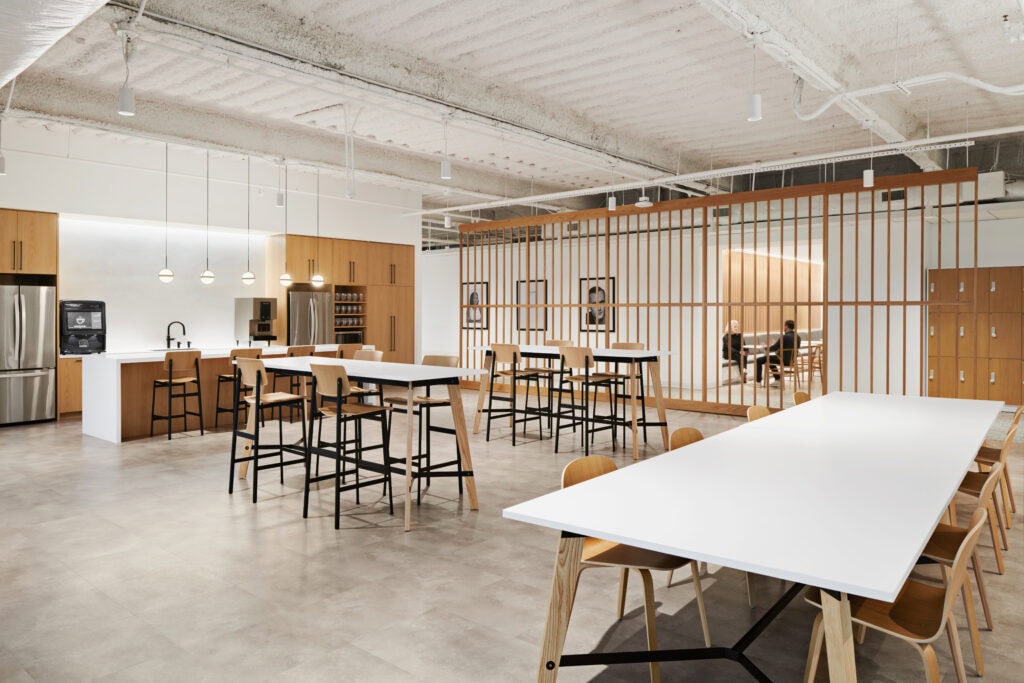
The Role of Comfort in Productivity
Comfort plays a pivotal role in boosting employee productivity and satisfaction. When employees are comfortable, they can focus more effectively on their tasks, leading to enhanced output and quality of work. Ergonomic chairs and desks that support natural body movements can significantly reduce fatigue and discomfort, allowing employees to maintain their concentration for extended periods.
Furthermore, comfortable environments contribute to mental well-being, reducing stress and enhancing overall job satisfaction. Companies that prioritize comfort in their office design are committed to employee health, which can foster a sense of loyalty and reduce turnover. Organizations can cultivate a positive work atmosphere by selecting furniture that meets employees’ ergonomic needs and creating inviting spaces. This not only helps in retaining top talent but also positions the company as a desirable place to work, where employee well-being is a core value.
Hybrid Workspaces and Their Impact on the Economy
Hybrid workspaces are reshaping the economic landscape by offering flexible work environments that balance remote and in-office work. This shift allows companies to optimize real estate costs by reducing the need for large, permanent office spaces. As a result, organizations can allocate resources more efficiently, potentially investing in technology and employee development instead. Moreover, hybrid workspaces support a distributed workforce, enabling companies to tap into a global talent pool and driving job creation across diverse geographic regions.
The economic impact extends to local businesses, as employees working from flexible locations support nearby services and amenities. Additionally, hybrid models promote environmental sustainability by reducing daily commutes, contributing to lower carbon emissions. Companies embracing hybrid workspaces enhance operational efficiency and employee satisfaction and contribute positively to the broader economy, demonstrating a sustainable approach to modern business practices.
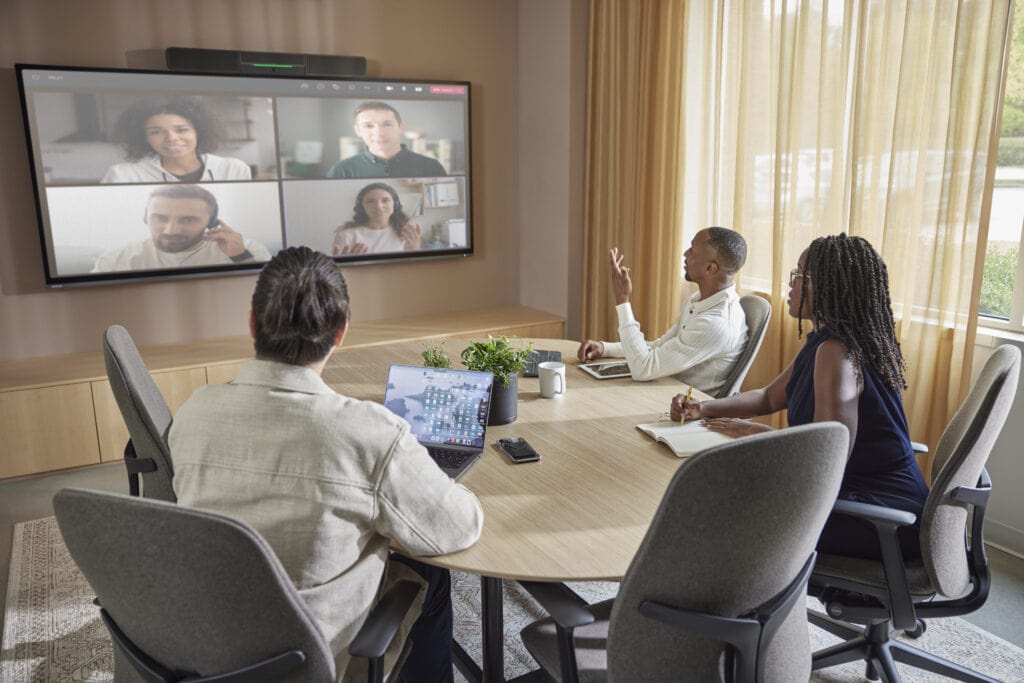
Adapting to Technological Advancements
Adapting to technological advancements is crucial for modern office design, ensuring workplaces remain relevant and efficient. As technology evolves, so do the needs of businesses and their employees. Integrating advanced tools like smart office systems and devices helps streamline operations and enhance the user experience. For instance, furniture with built-in wireless charging capabilities and adaptable layouts can support diverse work styles and tech requirements. These innovations boost productivity and attract tech-savvy talent who value a forward-thinking work environment.
Moreover, technology facilitates remote work and virtual collaboration, which is essential to today’s work models. As organizations continue to embrace these advancements, they must prioritize adaptability, ensuring their infrastructure can evolve alongside technological trends. This proactive approach future-proofs the organization and positions it as a leader in innovation, appealing to employees and clients alike.
Future Trends in Office Furniture
Minimalism in office furniture design continues to be increasingly popular as companies strive for simplicity and functionality. This trend focuses on creating clutter-free environments that enhance focus and productivity. Using clean lines, neutral colors, and multifunctional pieces, minimalist designs cultivate a sense of calm and order. This approach not only appeals aesthetically but also supports the efficient use of space, which is particularly beneficial in smaller offices or flexible workspaces.
Furthermore, minimalism often aligns with sustainable practices, emphasizing quality over quantity and encouraging using durable materials that reduce waste. A minimalist environment can reduce visual distractions, allowing employees to concentrate better on tasks.
“A study by ZipDo highlights that minimalist office design can lead to a 20% increase in focus.” — Source, Zipdo, July 2024
This statistic underscores the effectiveness of minimalist design in enhancing concentration and productivity in the workplace.
Embracing minimalism also reflects an organization’s commitment to modernity and efficiency, traits that resonate with potential talent. As businesses continue to evolve, the minimalist trend is set to shape office environments, fostering functional and inviting spaces.
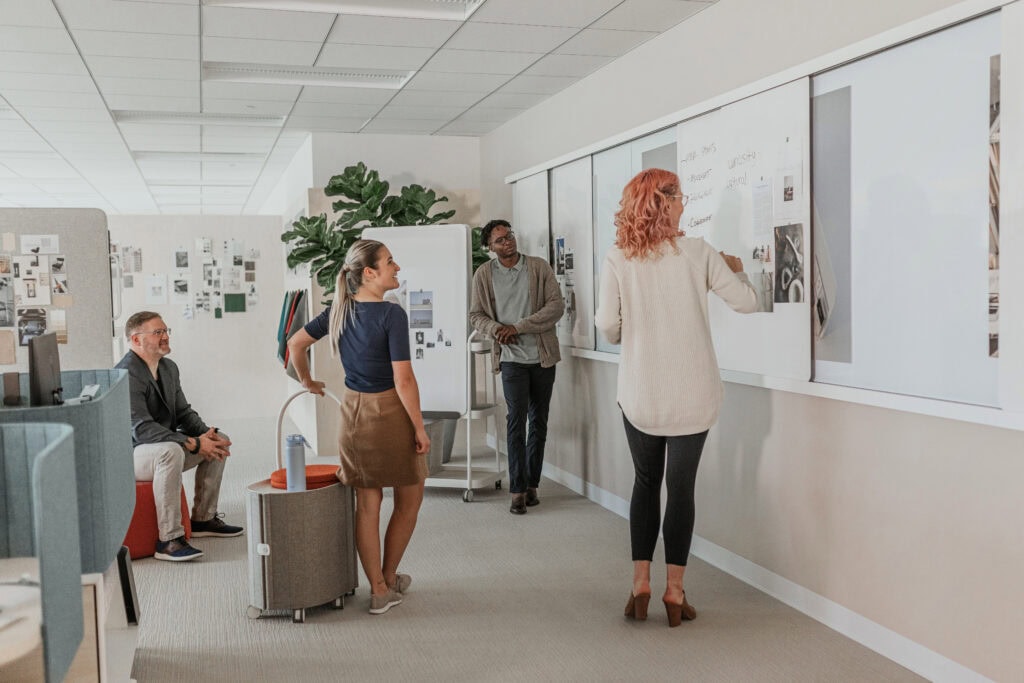
Custom Solutions for Unique Workplaces
As workplaces become increasingly diverse and specialized, the demand for custom furniture solutions is rising. Tailored designs that cater to specific needs and preferences can significantly enhance an office’s functionality and aesthetic appeal. Custom furniture lets companies directly incorporate brand elements and cultural values into their workspace, creating a cohesive and inspiring environment. This personalization fosters employees’ sense of belonging and pride, increasing engagement and productivity. Moreover, custom solutions can address unique spatial challenges, ensuring that even unconventional or compact areas are utilized efficiently.
By investing in custom furniture, organizations can differentiate themselves in the competitive talent market, showcasing a commitment to innovation and employee satisfaction. As the future of work continues to evolve, custom solutions will play a pivotal role in creating adaptable, personalized work environments that meet the diverse needs of modern businesses.
Create Spaces That Tell Your Story
Do you want to transform your office into a dynamic, hybrid workplace that fosters team trust, collaboration, and well-being? Our expertise in innovative design elements, ergonomic solutions, and advanced technologies ensures your workspace tells your unique story while promoting productivity and employee satisfaction.
Connect with us today to start your journey towards a more resilient and adaptable workplace. Together, we can create environments that empower your team to thrive, no matter where they are. Let’s build the future of work, one innovative space at a time.
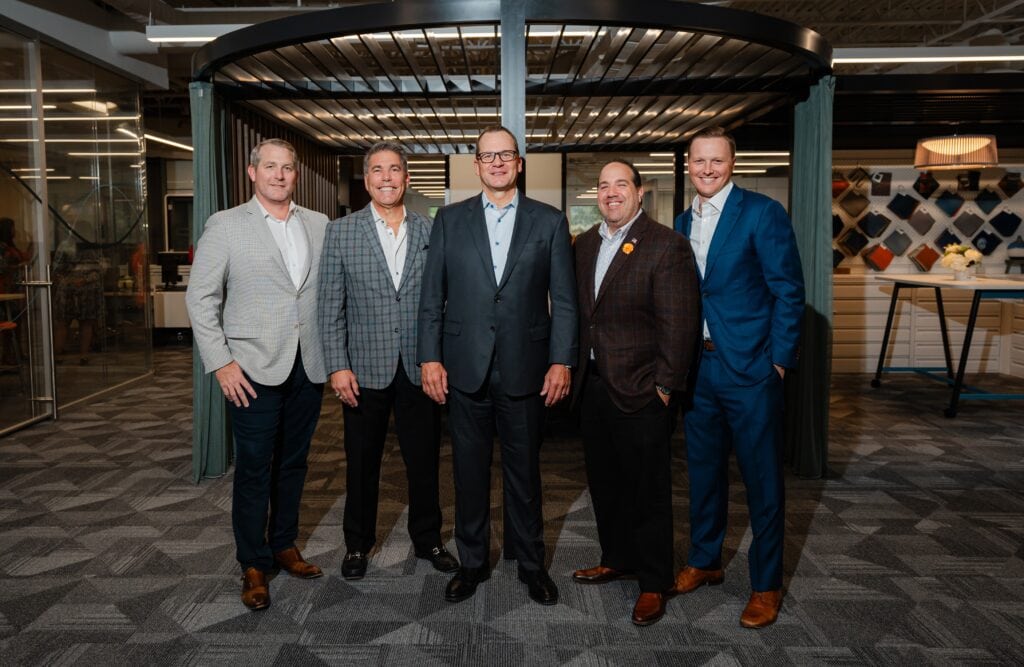
About FMG
FMG designs, specifies and delivers comprehensive workplace solutions. As a “Best In Class Dealer,” FMG has a strategic partnership with Haworth Inc., a global leader in the design and manufacturing of commercial office furniture that includes movable walls, systems furniture, seating, storage, and more.
FMG’s commitment goes beyond providing world-class furniture and architectural products. The very essence of our company is founded on values that place our clients at the heart of everything we do, treating them like family and building trust through exceptional service.


